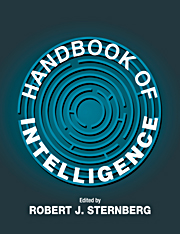Book contents
- Frontmatter
- Contents
- Preface
- Contributors
- PART I THE NATURE OF INTELLIGENCE AND ITS MEASUREMENT
- PART II DEVELOPMENT OF INTELLIGENCE
- 4 Heritability and Intelligence
- 5 Intellectual Development in Childhood
- 6 Intellectual Development in Adulthood
- PART III GROUP ANALYSES OF INTELLIGENCE
- PART IV BIOLOGY OF INTELLIGENCE
- PART V INTELLIGENCE AND INFORMATION PROCESSING
- PART VI KINDS OF INTELLIGENCE
- PART VII TESTING AND TEACHING INTELLIGENCE
- PART VIII INTELLIGENCE, SOCIETY, AND CULTURE
- PART IX INTELLIGENCE IN RELATION TO ALLIED CONSTRUCTS
- Author Index
- Subject Index
6 - Intellectual Development in Adulthood
Published online by Cambridge University Press: 05 June 2012
- Frontmatter
- Contents
- Preface
- Contributors
- PART I THE NATURE OF INTELLIGENCE AND ITS MEASUREMENT
- PART II DEVELOPMENT OF INTELLIGENCE
- 4 Heritability and Intelligence
- 5 Intellectual Development in Childhood
- 6 Intellectual Development in Adulthood
- PART III GROUP ANALYSES OF INTELLIGENCE
- PART IV BIOLOGY OF INTELLIGENCE
- PART V INTELLIGENCE AND INFORMATION PROCESSING
- PART VI KINDS OF INTELLIGENCE
- PART VII TESTING AND TEACHING INTELLIGENCE
- PART VIII INTELLIGENCE, SOCIETY, AND CULTURE
- PART IX INTELLIGENCE IN RELATION TO ALLIED CONSTRUCTS
- Author Index
- Subject Index
Summary
As for writing, I still write – at age 72. My experience is that I have to strive harder, tire sooner and come apart at the seams more completely than was the case when I was younger. The aging mind has a bagful of nasty tricks, one of which is to tuck names and words away in crannies where they are not immediately available and where I can't always find them
(E. B. White in Taylor, 1984, p. 113).There is often a mysterious growth of the mind, which we can trace to no particular efforts or studies, which we can hardly define, though we are conscious of it. We understand ourselves and the past, and our friends and the world better
(Channing as cited in Taylor, 1984, p. 102).These two quotations illustrate the tension that exists in the literature regarding age-related differences in intelligence across adulthood. The view that intelligence largely declines in adulthood has perhaps received the longest and most overwhelming support. Intelligence during adulthood is characterized by declines in the speed of mental processes, in abstract reasoning, and in several measures of memory performance (see Salthouse, 1991, for a review). However, much empirical and theoretical work characterizes adult intellectual development as being marked by progressive growth in the ability to integrate cognitive, interpersonal, and emotional thought so that the type of synthetic understanding of self and others that Channing spoke of is possible (see Labouvie-Vief, 1992, for a review).
- Type
- Chapter
- Information
- Handbook of Intelligence , pp. 117 - 138Publisher: Cambridge University PressPrint publication year: 2000
- 11
- Cited by



